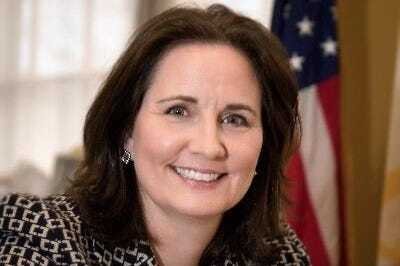We have all dealt with government red tape and bureaucracy. We create new accounts for every department, validate our identity multiple times, and question why government services do not securely share our data.
Liz Tanner has served as the Director of the Department of Business Regulation for Rhode Island since 2017. Earlier this year, Governor McKee named her the Secretary of Commerce for Rhode Island. When Liz joined state government, she set out to change the red tape and bureaucracy and elevate the rank of Rhode Island in business climate statistics. Scouring the country, Liz found no inspiration from larger states with more resources. In fact, with a few exceptions, states conducted business in the same way. Looking internationally, she was intrigued with Estonia as one of the first nations in the world to embrace and deploy blockchain technology in production systems.
Introducing Blockchain technology to government with Estonian model
The Estonia model made conducting business with the government easy and frictionless. Using blockchain technology, citizens enter their information only once and the same information would be available when interacting with many agencies and departments of government, such as applying to college or obtaining a license or permit. Liz was keen to take the Estonia blockchain experience to Rhode Island.
In 2017, the state floated an RFP to explore the concept of introducing Blockchain technology to the government. The response was unprecedented, with over sixty ideas from over thirty vendors covering various businesses, from marijuana to permitting and licensing to health care.
Rhode Island chose Infosys Public Services to help streamline the process of opening a new business. However, a deep dive determined that five independent state agencies were involved in this process. Recognizing that long term adoption is dependent on the success of the pilot, the project scope was narrowed to the Department of Business Regulation.
The initial proof of concept work centered on credentialing Certified Public Accountants (CPAs) as a low-risk project that could prove the technology.
Continue reading: https://www.forbes.com/sites/patrickmoorhead/2022/10/05/rhode-island-wants-to-make-it-easier-to-do-business-using-blockchain-technology/?sh=573c99cf7a25
Liz Tanner has served as the Director of the Department of Business Regulation for Rhode Island since 2017. Earlier this year, Governor McKee named her the Secretary of Commerce for Rhode Island. When Liz joined state government, she set out to change the red tape and bureaucracy and elevate the rank of Rhode Island in business climate statistics. Scouring the country, Liz found no inspiration from larger states with more resources. In fact, with a few exceptions, states conducted business in the same way. Looking internationally, she was intrigued with Estonia as one of the first nations in the world to embrace and deploy blockchain technology in production systems.
Introducing Blockchain technology to government with Estonian model
The Estonia model made conducting business with the government easy and frictionless. Using blockchain technology, citizens enter their information only once and the same information would be available when interacting with many agencies and departments of government, such as applying to college or obtaining a license or permit. Liz was keen to take the Estonia blockchain experience to Rhode Island.
In 2017, the state floated an RFP to explore the concept of introducing Blockchain technology to the government. The response was unprecedented, with over sixty ideas from over thirty vendors covering various businesses, from marijuana to permitting and licensing to health care.
Rhode Island chose Infosys Public Services to help streamline the process of opening a new business. However, a deep dive determined that five independent state agencies were involved in this process. Recognizing that long term adoption is dependent on the success of the pilot, the project scope was narrowed to the Department of Business Regulation.
The initial proof of concept work centered on credentialing Certified Public Accountants (CPAs) as a low-risk project that could prove the technology.
Continue reading: https://www.forbes.com/sites/patrickmoorhead/2022/10/05/rhode-island-wants-to-make-it-easier-to-do-business-using-blockchain-technology/?sh=573c99cf7a25

